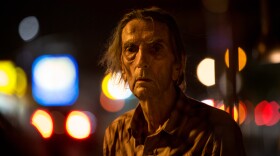Under the Tree comes from Iceland, but unlike most Icelandic films, you see little of the landscape. No vast areas of white snow and ice, no pictures of small settlements clutching the ocean shoreline. Instead, the film takes place in a suburb that looks like most bland suburbs in the western world. And yes, there’s a tree and yes, it’s an issue in the lives of two neighbors.
On one side lives a couple in late middle age, and the tree sits on their property. Next door lives a younger couple. The woman likes to ride her bike, and she likes to sunbathe – but the tree casts a shadow.
Under the Tree lies somewhere between an Icelandic saga from the Middle Ages which recounts an unending pattern of vengeance between two families and is no joke, and a Laurel and Hardy film – in which the two loveable dopes wind up in hilarious but still violent tit for tat encounters with other infantile people. Tensions between the neighbors escalate and no one seems to have access to either sanity or common sense. The film has a potent understanding of the slow pace of rising tension, along with a sense of how the rigid forms of contemporary architecture cannot control the irrationality of human beings. The picture is, of course, a parable of contemporary life – and maybe it’s not too far off.
Eighty-year old Russian filmmaker Andrei Konchalovsky’s Paradise is an exceptional work. His career includes Maria’s Lovers, Siberiade and Runaway Train, and with Paradise he creates an important original take on World War II. The Nazis were always critical to the old Soviet filmmakers – like Konchalovsky – because the Nazis were an obvious enemy, approved by all as villains, and it became an easy metaphorical step to see Nazis but understand they stand in for the Soviets.
Paradise follows three characters – a French collaborator who calmly works for the French police and sends hundreds to the death camps, a Russian countess who joins the French resistance, and a young SS officer. They each tell their story, but it’s mysterious to whom they speak. As the events of their lives run on screen, there are occasional images of each of them sitting at a table telling their story to someone – the audience doesn’t know who until the end. The two men, are full of self-justification. The police officer calculates his future and tries to bet on who will win and what will be best for him. He has no morality at all, no beliefs, other than self-interest. The young SS man is a hopeless true believer. The countess has exploited and compromised and humiliated herself, eventually to save two young Jewish children.

Konchalovsky films in black and white. His picture is stark – who these people are is there for us to see and consider.
Happily, the Denver Film Festival does not limit itself to the misery of the human condition. Ramen Heads, by Japanese filmmaker Koki Shigeno observes 15 months in the life of one of Japan’s greatest makers of ramen noodles. Osamu Tomita is beyond obsessive. He blends four broths into the daily mix. He makes his own noodles, of course, the kind called tsukemen, which are a little different from what you see in most restaurants.
Ramen came to Japan from China about 150 years ago, but took on special meaning after World War II, when, according to the film, ramen sustained the population both physically and emotionally. It is still crucial that ramen be fabulous but not fancy. In a remarkable sequence toward the end of Ramen Heads, the great Tomita works with two other famous chefs to make a special new ramen for the 10th anniversary of his tiny restaurant. Just the night before, the three agree the broth tastes too refined. What to do? They figure it out in the nick of time. Don’t see Ramen Heads if you are already hungry – because you’ll be ravenous when it ends.






